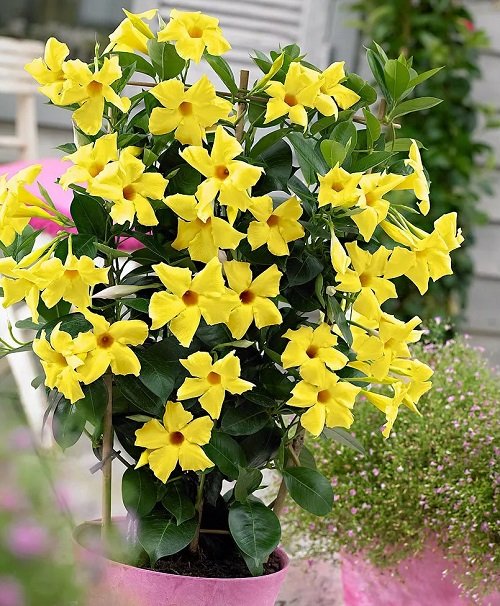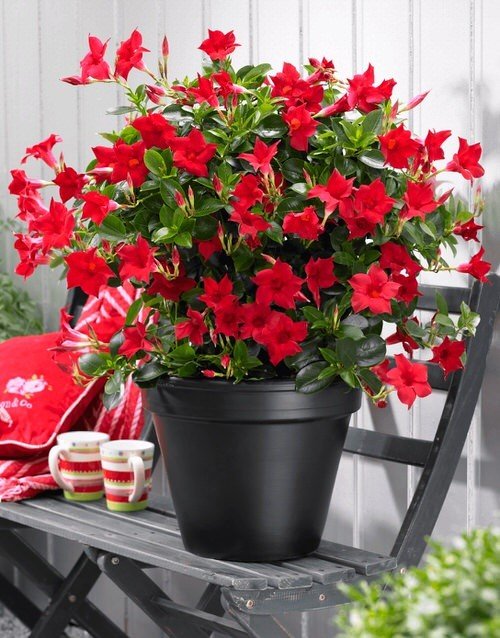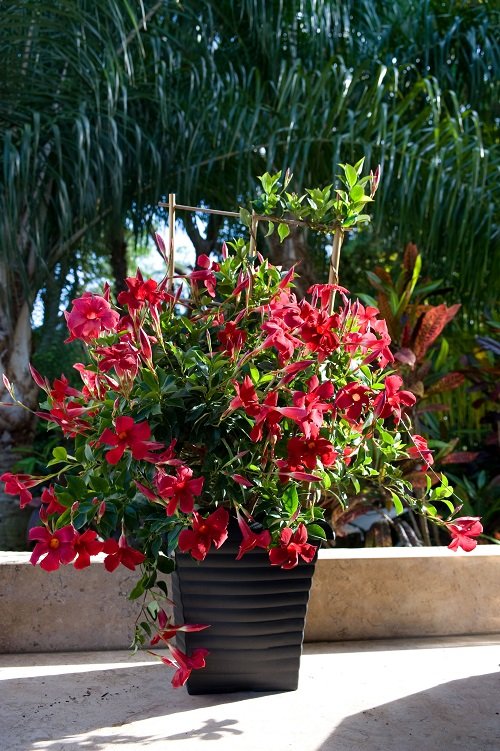
Mandevilla Plant Care: How to Grow Mandevilla in Pot | Best Varieties
Mandevilla Plant Care: How to Grow Mandevilla in Pot | Best Varieties
The Mandevilla is a perennial plant that is easy vine to grow and Care? Here’s everything you need to know!
Mandevilla Information
The Mandevilla vine known as the Rock-trumpet ,Mandevilla has many varieties it’s a quintessential tropical vine which is tropical plant belonging to the Apocynaceae family(Central and South America USDA hardiness zones 9 – 11). Mandevilla come in a range of colours including pink, white and red.
What Is Mandevilla

Propagating mandevilla from cutting is a fairly easy process too. Take cuttings during the spring for best results. When selecting a piece to cut, ensure it’s either a side shoot or tip around 7.5 centimetres long. Keep the top to leaves and remove the rest. Place the cuttings in a mix of sand and peat, placing it in a warm, humid, shady, and moist area. Once the roots have developed you can place the plant in its official pot.
Mandevilla Sanderi
This variety popular as Brazilian Jasmine, it is a fast-growing with woody, twining stems, and huge red flowers.
Mandevilla Splendens

Mandevilla Splendens look stunning with Rectangular leaves and yellow blooms.It grows best in full sunlight.
Mandevilla Alice du Pont
Mandevilla alice du pont can grow up to 4-5 feet tall in pots. It bright red blooms with yellow throats.
Mandevilla Boliviensis

Mandevilla Boliviensis popular as White Mandevilla. It can grow 3-10 feet tall and spread 3-6 feet wide, this variety is famous for its delicate white flowers.
Mandevilla Sunmandecrim
This variety in partial shade, unlike other types that prefer full sunlight.It can grow up to 4-6 feet tall in pots.
Mandevilla Laxa
Mandevilla Laxa Called Chilean Jasmine, and this variety produces clusters of fragrant solid white blooms.
Tips and Requirements for Growing Mandevilla

Mandevilla always love growing in tropical climates, they bloom in summer till fall, and in warmer places, rain, and well-draining soil .Find a spot for mandevilla with at least six hours of sun each day, although in hot climates, a little afternoon shade is helpful.
Sunlight
Mandevilla vines bloom best in full light. So keep the containers 4- 6 hours a day of direct sunlight and you won’t get as many flowers. If you grow mandevilla vines in a pot, you can move the plant under a patio roof or shade tree to keep its leaves from getting scorched.
Temperature and Humidity
Mandevilla plants are happiest in places where nighttime temperatures don’t go below 40 degrees. It should be between 60-75°F or 15-24°C and not less than 50°F or 10°C at night. A hard freeze will kill them. Bring them indoors if they’re in a pot. If you live in a dry climate or you’re growing them indoors, mist their leaves regularly to keep humidity levels high to help them live their best life.
Water
Mandevilla can tolerate some dryness and keep flowering, unlike other flowering plants. It also loves a consistent moisture level, so keep the soil damp but not soggy.
Fertilizer
Feed the plant before they start blooming, because producing flowers takes a lot of nutrition. You can also use a half-strength liquid fertilizer on your mandevilla every 2 weeks Additionally, add some compost to the soil to boost growth.
Pruning
The best time to cut mandevilla back is winter or early spring, before it starts blooming. Remove damaged or diseased and you should to keep your mandevilla healthy. Use a sterilized and sharp pair of pruners. Also, do not cut over one-third of the plant’s size at a time. Prune mandevilla vines at least once a year to keep the plant tidy and blooming.
Pests & Diseases
Mandevilla indoors for the winter, it can be vulnerable to whiteflies , aphids, scales, spider mites and mealybugs. Even the hardiest tropical plants can struggle when they have to spend months indoors, away from their natural environment. If your mandevilla gets an infestation, whip out the neem oil or insecticidal soap and spray to treat the plant’s.









Average Rating